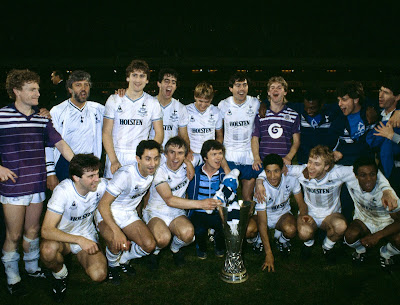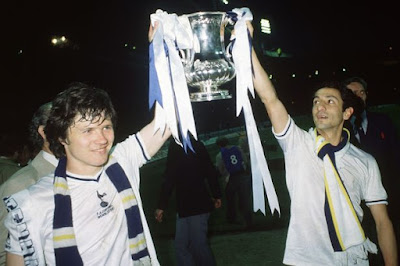Ardiles and Villa: Footballing émigrés | @RichEvansWriter
Military events in the South Atlantic – even at a distance of 8000 miles – had a profound impact on a celebrated pair of international footballers in the 1980s. @RichEvansWriter takes up the story:
When one thinks of footballers and war, images of khaki-clad figures of yesteryear tend to spring to mind – the kind of ‘moustached archaic faces’ that Philip Larkin details in his poem MCMXIV. However, footballers do not have to be participants to be affected by conflict. Indeed, as with any civilians, they may well be unwitting victims with no stake in political events beyond their control.
In certain instances, football risks turning into an extension of the battleground – where players, subject to barbarous words and threats, become targets of abuse. Such was the case in 1982 with Ricardo Villa and Ossie Ardiles – then both of Tottenham Hotspur – whose fates (at least in the short term) were determined by events unfolding on the other side of the world.
The Falklands Conflict, prompted by Argentine forces invading two of Britain’s dependent territories, took place between 2nd April 1982 and 14th June 1982. While neither the UK or Argentina’s ruling military government officially declared war, both classified the islands as a war zone and, in the 74 days of conflict prior to ceasefire, 907 were killed.
Patriotic sentiment was stirred in both nations, but Argentinian expats Villa and Ardiles, were particularly vulnerable to terrace-borne ire. The pair were among the first of a raft of overseas signings that began in the late 1970s. February 1978 had seen European Community legislation instructing the footballing associations of member states to allow foreign players access to playing in each other’s countries. In England, this meant the overturning of a ban that had effectively been in place since 1931; while it didn’t immediately stop the entrenched outlook of xenophobia, it certainly paved the way to foreign signings became a little more commonplace.
 |
| HMS Sheffield was sunk during the Falklands War in May 1982 |
Villa – a Buenos Aires native – had been a member of the Argentina team that won the 1978 World Cup. Shortly afterwards, he was signed by Tottenham and arrived at White Hart Lane to a heroes’ welcome. In his 179 appearances for the club, he scored 25 goals, including the famous winner against Manchester City in the 1981 FA Cup Final replay which is etched onto the collective consciousness of all football fans. The goal – as if its brilliance really needed underlining any further – was subsequently voted the Wembley Goal of the Century. Ardiles joined Spurs at the same time as his compatriot; he went on to spend a total of ten seasons at the club and featured in the 1981 FA Cup victory alongside Villa.
Ardiles’ final game for Tottenham in the 1981-82 seasons came in the FA Cup Semi-final against Leicester. The match, played at Villa Park, saw Spurs emerge 2-0 victors. Following this, Ardiles was called up to international duty, representing Argentina in friendlies against the Soviet Union (14th April); Bulgaria (5th May), and Romania (5th May). Villa – whose final international appearance had been in the 1978 World Cup Final, remained in North London. As it was, neither player featured in the 1982 FA Cup Final. Villa’s last game for Tottenham was on 17th May 1982, when he played in a 2-1 defeat to Bobby Robson’s Ipswich Town. He later claimed he had opted not to play in the Wembley match due to tensions caused by the conflict; the hostilities of the Falklands war remained ongoing at this point.
The longer-term issue concerned how Tottenham would proceed; while both players had abundantly proved their commitment to the club, they were now effectively persona non grata. As his withdrawal from the FA Cup Final had proven, Villa’s situation was becoming increasingly untenable. In each case, wider forces conspired to force Spurs’ hand: Villa left, winding down his playing career in Argentina after first making 19 appearances for the Fort Lauderdale Strikers in the North American Soccer League.
The difficulty Ardiles was experiencing in trying to return to England, meant that a compromise had to be reached. In a necessary act of diplomacy, Spurs loaned him to Paris Saint-Germain where he represented the club 14 times. Happily, after his stint in France, he returned to White Hart Lane, helping Tottenham to win the UEFA Cup in 1984. In becoming footballing émigrés, both these players help to highlight the complicated and far-reaching links between footballers and war; they go some way to illustrating how – at times – football acts as much more than a mere sport, but serves as a reflection of much broader political and international issues.
 |
| Ardiles helped Spurs lift a UEFA Cup in 1984 |
While hostilities in the South Atlantic ended in mid-June of 1982, tensions remained high. Indeed, the participation of the Home Nations very much hung in the balance in the run up to the twelfth edition of the World Cup. FIFA had decreed that, as defending champions, they would not countenance asking Argentina to withdraw from the tournament.
As a result, the idea of England, Northern Ireland and Scotland absenting themselves was mooted, and Neil Macfarlane – British Minister for Sport – had suggested that there should be an official decree to ensure no contact between the conflicted parties. Furthermore, there was also a sense that the atmosphere was further complicated by the existence of strong diplomatic ties between Argentina and Spain.
In another example of how football may carry a significance well beyond the pitch, anxieties grew. It swiftly became apparent that no other nations were prepared to withdraw from the tournament in solidarity with either side. Therefore, the decision concerning the Home Nations’ participation became a pressing issue. As it was, Cabinet Secretary Robert Armstrong made the decision that British nations would be allowed to participate – it was reasoned that their absence would otherwise be utilised by Argentina for propaganda purposes.
The draw commenced with a pot system that ensured the six seeded teams were allocated different groups. Naturally, Argentina – as defending champions – were seeded. More surprisingly, so were England and it was a decision challenged by some other nations. After all, it was 12 years since they had last qualified for a World Cup (1970); they had failed to qualify for the 1972 and 1976 European Championships, and had not progressed beyond the group stages in 1980, so they hardly presented as world beaters.
FIFA’s world rankings were not introduced until December 1992, so seeding decisions were far more arbitrary. FIFA executive Herman Neuberger justified the England’s place in the pot by claiming ‘the Spanish want[ed] England to play in Bilbao for security reasons’. This may well have been the case, but there has has been much debate that the decision to seed England was a deliberate ploy to avoid them meeting Argentina. As it was, both teams were eliminated in the second round.
At worst, Villa and Ardiles were victims of inconvenience and verbal assaults. The true victims – as in all wars – are, of course, those left beneath the ground, be they civilians or military personnel. In times of conflict, that people should revert to identifying themselves based purely on lines drawn upon maps is a sad indictment of the darker aspects of humanity. That two men should have been revered for their footballing ability one day but risked being reviled for somehow embodying the ills of their politicians the next, is ridiculous. It is, however, a fact of life.
In the current era, footballers are – more than ever – global citizens. The universal appeal of sport is well-known, but the danger of it being co-opted for political gain or used to stoke nationalist fervour remains. In this era of massive money with sport and venture capitalism being indivisible, the case of Ardiles and Villa serves as a salutary lesson. In particular, the good grace and positivity exhibited by Ardiles was manifested in his triumphant return to Tottenham, both as player and then subsequently as manager. His conduct, and status as a Spurs legend reminds us that the true essence of football lies in it being a unifying force for good; a force for peace, and a force with the power to heal wounds rather than an outlet for settling political scores.
 |
| FA Cup success in 1981 |
By Rich Evans, written for @TFHB.
(All pictures borrowed and not owned in any form by TFHB)






Comments